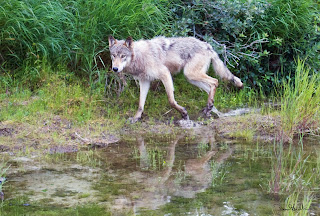5 ePharma Reflections from Alaska
By on Sep 23, 2009
The state of Alaska might seem an odd place to reflect on pharma marketing truths and tenets. But after a recent 2-week trip to the Land of the Midnight Sun, I was inspired by both the wildlife and humans that inhabit that strange land. Below are some of those reflections
- Eat what you can when you can. One arm of our trip was at the amazing Brooks Camp bear refuge in Katmai National Park. There, coastal grizzly bears fed incessantly on salmon and other fish, fattening up for the winter hibernation. But further north in Denali National Park, the grizzly bears were much smaller in stature. Thats because their bear buffet consisted mostly of wild berries, with not a salmon in sight. But still, they survive and even thrive. The lesson? Sometimes you have to just take what you can get. Maybe your regulatory team wont let you launch that Twitter page yet. But will they at least let you monitor social media, in order to listen to the conversations that are inevitably happening with or without you? Listening is the first step to starting that dialogue. Maybe theyll come around dont give up.
- Adapt or die. In Denali National Park, we were lucky enough to spot three specific, unique animals - the snowshoe hair, arctic ground squirrel, and willow ptarmigan - that all change color with the season. When the severe and snow-covered blanket of winter falls upon the Alaskan Range, these animals adapt their camouflage by turning white. Marketers - especially pharma marketers - need to be able to adapt as well. If you're still sticking to your traditional advertising approach, those days are over. Across the board, budgets have been shifting to digital marketing for a reason. Though big pharma's big wheels are infamous for turning slowly, it's exciting to see many pharmaceutical companies beginning to embrace new opportunities in online marketing and social media. Are you in marketing but arent comfortable or knowledgeable about digital yet? Know a little about digital but need to deep-dive into specialty areas such as analytics, search marketing, email, usability, or media? Its time to get smart. Hire a knowledgeable agency and let them help you get where you need to be.
- Be passionate about what you do. We saw a demonstration of the amazing sled dogs that carry the Denali park rangers on three-week patrols during Denalis harsh winters. The dogs got so excited when the sled was brought out for harnessing that the handlers had to lift the dogs up on their back two legs so they could control them. Say what you will about the perceived inhumanity of sled dog races like the Iditarod, but the dogs we saw in Denali absolutely LOVE pulling that sled. They live for it. Ive heard more than one client-side pharma marketer be completely exasperated about their world lately; some are even looking to get out of the industry altogether. I understand. Between warning letters, regulatory restrictions, conservative mindsets, and banging our heads against the social media wall, these are tough times to be a pharma marketer. But hang in there! This industry needs your passion now more than ever to get us out of the funk and get some creative, innovative, and effective pharma marketing out there. The pendulum is always swinging back and forth this, too, shall pass.
- Take advantage of what you have when you have it, and make the best of what you have when you don't. When we were in Alaska in August, the sun was setting at about 10:30 p.m. each night, but they were losing 7 minutes of daylight a day. One Homer, AK local explained that in the summer, locals make it a habit to make the most of the daylight. They work hard, play hard, get a lot less sleep, and take full advantage of the long days and sunlight. In the winter, they hunker down. They tend to work less hours and sleep a lot more. Makes sense, right? Kind of like the bears hibernating. The pharma industry is at a crossroads. Blockbusters are going the way of smaller niche drugs. With digital marketing and social media upon us, the marketing world is changing dramatically. Healthcare reform may have serious implications for the way pharmaceutical companies operate. We must make the best of what we have today, because we never know good or bad what tomorrow may bring.
- It's okay - and often wise - to challenge conventional wisdom. As long as you have the data to back it up. One American naturalist, Adolph Murie, made an important mark on how the National Parks Service handled wolves. Wolves had long been observed killing prey such as caribou and Dall sheep, and their predatory habits were considered bad for the parks ecosystem. After spending years as the first scientist to study the wolves behavior in the wild, Murie actually went against conventional thinking that wolves were a nuisance. In fact, Muries research showed the opposite that the wolves weeded out the sick and meek prey, leaving the stronger and healthier animals to survive and reproduce. His research led directly to the termination of predator eradication programs in Yellowstone and Mt. McKinley/Denali national parks. Considered a rebel and a rogue at the time, today Murie is revered and remembered with memorials, national landmarks, and awards in his honor. The moral of Muries story? Dont be afraid to go against the status quo. You just might change the world in the process.
Special thanks to hubby @BlackburnPhoto for the great wolf photo. Love wildlife? See more amazing pics from our trip on his Flickr page here.

